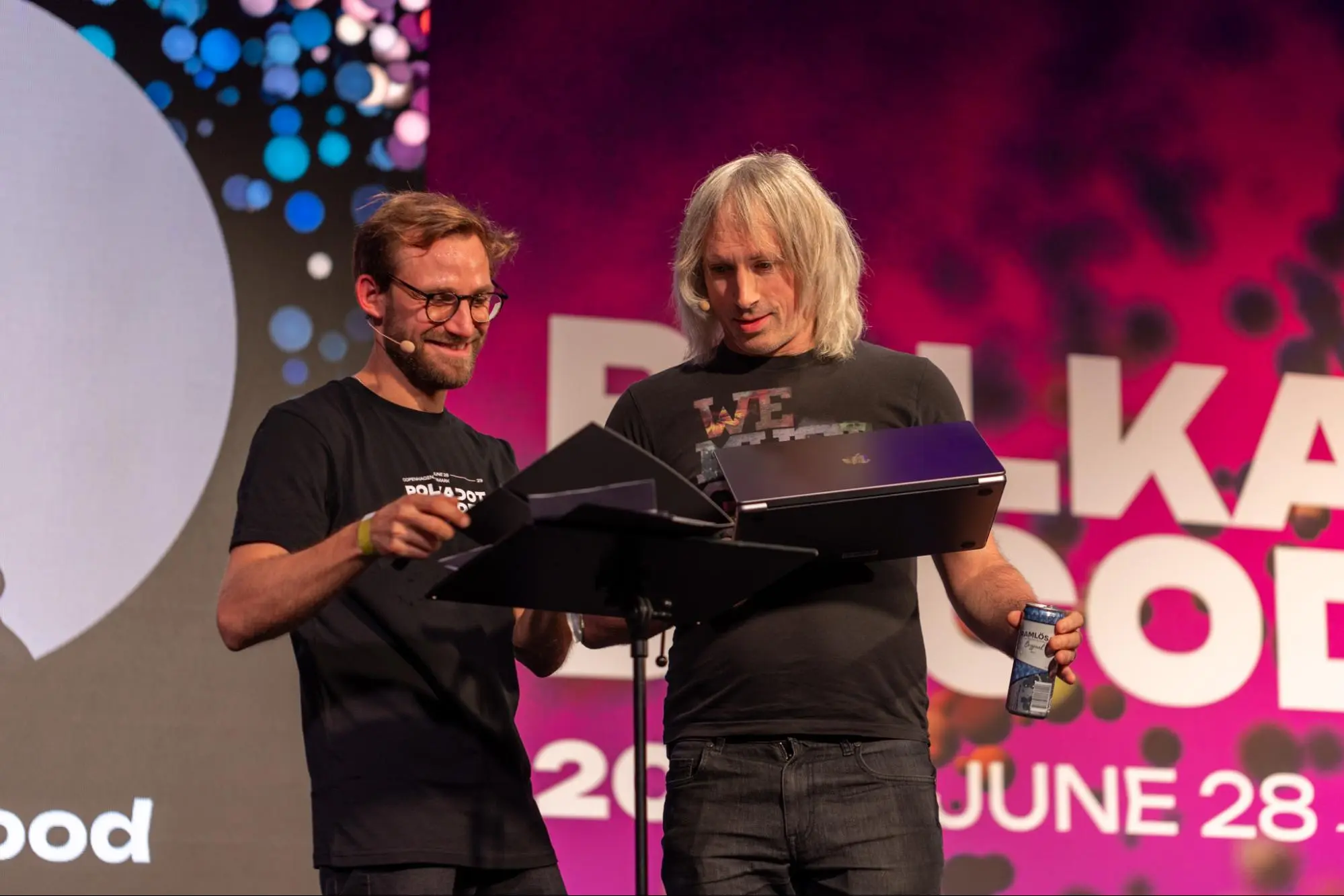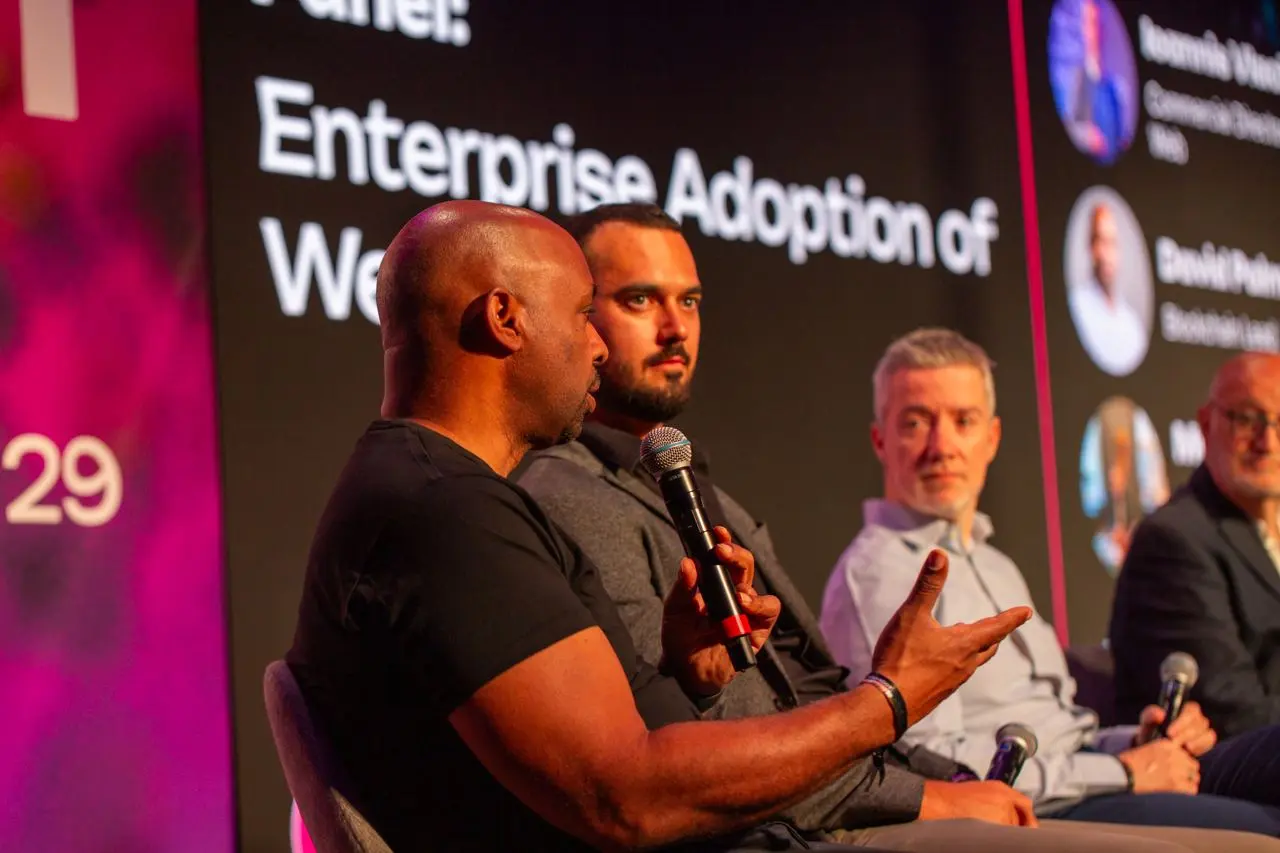Polkadot Decoded Presents Powerful Vision Across the Ecosystem in Two Action-Packed Days
Polkadot Decoded featured more than 100 talks from across Polkadot's blockspace ecosystem, as well as some big announcements, including from major enterprises like Vodafone and Deloitte.

Polkadot Decoded 2023 provided a rich assortment of fresh announcements and powerful visions for the future of the blockspace ecosystem for boundless innovation. Representatives from parachains, dapps and enterprises as well as regulatory experts and other Web3 voices made up a diverse speaker list of more than 100 people at Copenhagen’s buzzing Øksnehallen in the heart of the Danish capital. And thousands of attendees, representing Polkadot’s global community, watched online or inside the venue.
The blockspace ecosystem for boundless innovation
The concept of blockspace took center stage in several talks during the event. Polkadot founder Robert Habermeier spoke about the value of having a network offering blockspace that is secure, composable, flexible, efficient and cost-effective. As he explained, a blockspace ecosystem offering blockspace both on-demand or in bulk is important for supporting projects at every stage of growth. With the expected launch of on-demand parachains on the near-term roadmap, Polkadot will provide multiple allocation models, making it the most flexible blockspace ecosystem in Web3.
Habermeier said: “We're trying to generalize the offerings to hit different audiences. For a bootstrap start-up this would be as easy as ‘write code, deploy it and go’. You shouldn't be paying for blockspace you aren't using but you should be able to scale up and boost.”
Chief Architect illustrates a vision for the future of Polkadot

Dr Gavin Wood, Polkadot founder and Chief Architect at Parity Technologies, a leading contributor to the Polkadot network, took these ideas even further with a vision of Polkadot as a global, multi-core supercomputer. “Polkadot should be an integrated system, a single computer on which many applications run,” said Wood. This new direction would evolve Polkadot away from its current reliance on parachain slot auctions to offer more ways of connecting to the network, catering to a wider range of needs and serving different stages of a project’s growth cycle.
Wood also introduced the concept of ‘accords’, a potential model for creating opt-in ’treaty-like’ agreements to enable new functionality, such as decentralized exchanges spanning multiple chains, offering an even more secure and seamless user experience.
Polkadot tech bringing efficiency to aviation
On the second morning of Polkadot Decoded, Vodafone’s blockchain lead David Palmer dropped the exciting news that sim cards linked to the Aventus parachain will be inserted into cargo tracking pods used by airlines. Up to 10% of these pods go missing, costing the aviation industry $400m annually. Building on Aventus’ existing relationship with Heathrow Airport, the solution will radically improve the ability to track these cargo pods, bringing massive efficiencies to the sector. Vodafone also plans to be a Polkadot validator.
Palmer said: “We’re using a live IoT network to have secure, encrypted devices at either end. I’m delighted to be able to announce that partnership and the intention to move forwards. It’s the first of many use cases we’ll provide that link real-world devices to the blockchain. I’m also excited to announce our relationship with Polkadot, and want to bring more mobile operators to Polkadot.”

OpenZeppelin plans Polkadot builder support
Meanwhile, OpenZeppelin, the leading blockchain security company, announced it would soon open discussions with the Polkadot community on ambitious proposals to facilitate blockspace access.
Galo Tocagni, VP of security services, said: “The future economy is multichain, and Polkadot is best positioned to realize this future…. We’ve been engaging with Polkadot for a long time and now we want to build a parachain runtime library to provide faster access to Polkadot’s blockspace in a secure way.”
OpenZeppelin, used in 99% of the leading 100 DeFi protocols, is keen to leverage its expertise gathered from building standard libraries for EVM-compatible chains, and will look to build out a dedicated team providing full-time support to Polkadot ecosystem projects.
Mythical woos devs, Astar eyes gaming future
Mythical Games founder John Linden, whose company is moving its chain to Polkadot, produced demonstrations of metaverse-style games. He said: “We’re very excited to join the Polkadot ecosystem. We really want to have a full DAO behind us and get a lot of developers into the community. We are the third biggest chain in the world in terms of digital assets, we’re constantly growing and we’re bringing all of that over to Polkadot!”
Astar founder Sota Watanabe reacted to the news that electronics giant Sony was investing $3.5 million in Startale Labs, his network’s chief developer. He told the Decoded audience: “This investment will be a game-changer. We’ve already started conversations with them to make products together, including an acceleration program for gaming. We would like to help gaming companies grow on Astar.”
Other highlights included:
- Polkadot parachain KILT and the world’s biggest professional services firm, Deloitte, are partnering with Polimec, a new ecosystem team, to issue reusable KYC (Know Your Customer) credentials, enabling access to global fundraising of digital assets.
- A partnership between Sovereign Nature Initiative and Moonsama will bring data about lions in Kenya into virtual realms, benefiting real-world conservation efforts.
- The Substrate-built peaq announced it was bringing Teslas into the Polkadot ecosystem via the car-sharing start-up ELOOP.
- Evrloot revealed its new game Stardust Colonies would be built on Ajuna Network — demonstrating the growth of builder activity at the application layer.
- Energy Web, the world’s largest ecosystem of companies using open source, decentralized technologies to accelerate the energy transition, which recently announced that it’s coming to Polkadot, announced a partnership with Deloitte, with more details forthcoming.
Polkadot Decoded convened a strong array of builders, business owners, and Web3 enthusiasts. Many of them, still energized by the exciting news unveiled during the week, partied deep into the night at a closing party hosted by Beatport, the electronic music brand, which is launching a music NFT marketplace on Polkadot.
Stay tuned for videos from all the Polkadot Decoded presentations, coming soon to Polkadot's YouTube channel.
The next major Polkadot conference will be Sub0, the Polkadot Developer Conference, coming to Lisbon, September 19 to 20.
Interested in developing for or building on Polkadot? Get in touch for hands-on support.












